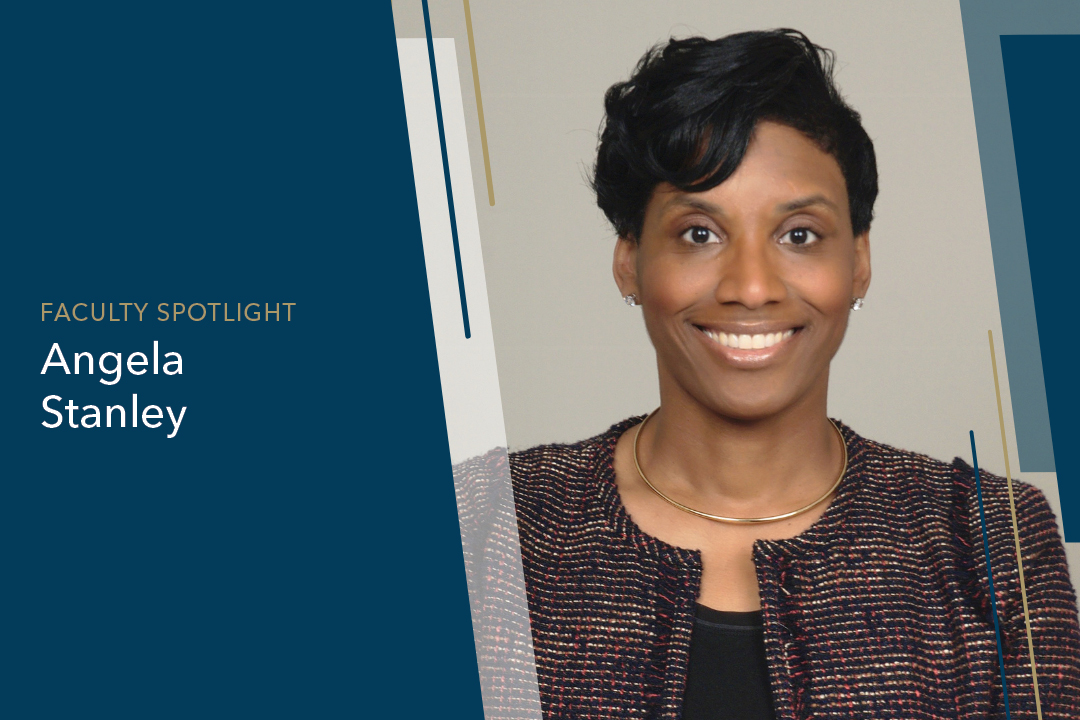Nursing was “definitely in the blood” says Angela Stanley, D.N.P., M.A., APRN-BC, PHCNS-BC, NEA-BC, of the career that’s taken her around the world. Her grandmother worked as a nurse, and the rest of her family worked as educators. “At this point in my life, [my career is] a nice blend of educating but also nursing,” Stanley says.
Stanley joins GW Nursing as a clinical assistant professor and will be teaching several courses within the Master of Science in Nursing Family Nurse Practitioner (FNP) program.
A retired commander in the United States Navy Nurse Corps, Stanley spent 20 years (12 of them as an FNP) caring for everyone with a connection to the military—active duty members of all of the American armed services as well as their families, military contractors, deployed coalition troops, foreign nationals, military retirees, and more.
Stanley initially worked in a mother-baby unit as a new nurse at the Naval Hospital in Camp Lejeune, North Carolina before shifting to labor and delivery, the unit she fell in love with and stayed in throughout her naval career. She also began taking on leadership roles in maternal child departments, including aboard the Navy hospital ship USNS Comfort, during a deployment to Okinawa, Japan. “My [career] experience has truly been a mixture of clinical and leadership [work],” she says.
After 20 years in the Navy, Stanley retired in 2017 and joined the faculty of the Medical University of South Carolina (MUSC) College of Nursing in the Doctor of Nursing Practice program.
During her time there, Stanley conducted quality improvement projects and received a fellowship to examine whether telehealth is a successful modality to precept advanced practice nursing (APRN) students. The COVID-19 pandemic caused many clinics to shut down temporarily and close their doors to nursing students, which left many nursing programs without clinical training opportunities.
“Telehealth is something I’ve become quite fond of, and I was initially looking at it for utilization of prenatal care,” Stanley says. “But then the pandemic sparked an interest of how can we utilize telehealth to truly foster or enhance clinical opportunities for our students so that they can continue on within their program with minimal interruptions.”
Stanley and her team found that telehealth is effective at precepting students who have already had some in-person clinical experience, but that it does not replace in-person interactions. If the COVID-19 pandemic, or another pandemic, were to surge again, telehealth could be a viable option to continue training nursing students.
Her experience as a naval officer informs her approach to teaching. She abides by the motto “Bloom where you are planted”—something she learned as a novice in the Navy Nurse Corps. “I remember myself and my peers recognizing we were at the bottom of the totem pole with regard to shift work and other issues that you tend to focus on as a new RN,” Stanley recalls. “‘Bloom where you are planted’ affords you the opportunity to learn your role and learn it well. Regardless of my work assignment or leadership role, I quickly understood the end goal—be the best individual and professional I can be.”
Although she’s new to the school, Stanley is not a stranger to Washington D.C. or George Washington University. She received her master’s in nursing from the Catholic University of America and took a course at GW University through the Washington Regional Nursing Research Consortium. The university’s affiliation with a medical center was crucial to her decision to join GW Nursing. “I look forward to the opportunities of working with different disciplines and the numerous opportunities of being at GW,” Stanley says.
"Bloom where you are planted" affords you the opportunity to learn your role and learn it well. Regardless of my work assignment/leadership role, I quickly understood the end goal - be the best individual and professional I can be."


